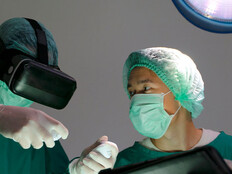Mobile Health Tech is Making PMI Research Possible
Strategic use of technology is proving key in the success of the Precision Medicine Initiative, a research effort launched by former President Barack Obama in 2015 that aims to revolutionize how we treat health and disease. The initiative is looking to move away from a one-size-fits-all approach to medicine and instead study how environmental and other factors play a role in well-being. Hopes are high for the results of the new custom-medicine initiative, which Obama announced during his 2015 State of the Union address.
With the majority of federal funds going toward the National Institutes of Health’s All of Us PMI research program, NIH has been doling out funds for research trials around PMI, much of which centers around gathering data through wearables and other mobile health technologies.
NIH has already awarded $207 million to the Scripps Research Institute (and millions more to other organizations) to launch trials that will enlist 1 million or more participants from diverse backgrounds. The trials will aim to understand their differences in environment, genes and lifestyle. These trials will lay the foundation for PMI in clinical practice, with the White House targeting cures for diseases like cancer and diabetes.
The range and scale of information from the large pool of participants will provide a resource to researchers that are looking to understand all factors influencing health and disease, according to NIH Director Francis S. Collins.
“Over time, data provided by participants will help us answer important health questions, such as why some people with elevated genetic and environmental risk factors for disease still manage to maintain good health, and how people suffering from a chronic illness can maintain the highest possible quality of life. The more we understand about individual differences, the better able we will be to effectively prevent and treat illness,” Collins said in a statement announcing the original $55 million funding award to Scripps, a number increased dramatically over the last few months.
mHealth Tech Delivers Data to PMI Researchers
New tools, like mobile sensors, smartphone apps and genomics, as well as new resources to track health information, are making the study possible, Eric Topol, director of the Scripps Translational Science Institute (STSI), told the San Diego Union-Tribune. Topol will be responsible for recruiting more than one-third of the 1 million participants into the study, noting that the study will focus on using mobile devices to collect real-world, real-time information.
As part of the research, volunteers will use mHealth tech to “correlate activity, physiological measures and environmental exposures with health outcomes,” according to an All of Us Working Group report. They will contribute new information to the study through mobile health data, alongside existing electronic health records, blood samples, baseline physical exams, online health surveys, and more.
In fact, the San Francisco-based company Vignet has already built a smartphone hub that will enable remote monitoring for the study.
"We’re going to make this as easy as possible for people,” Praduman Jain, CEO of Vignet, told the Tribune. “There’s only going to be one app. People won’t have to jump around to participate.”
Moreover, participants will be able to use the health data collected from smartphone apps and wearables such as Fitbits to create a full picture of their well-being.
“Unlike previous medical research, much of the data obtained from the participant will be returned to that individual on a continuous basis — and that data can be shared with the participant’s doctor,” Scripps’ Topol said.
Obstacles and Opportunity in Sifting Through the Data
Receiving personalized data in huge numbers is central to the study, but also proves an obstacle for researchers as they attempt to wade through the data.
“Since one of the goals of precision medicine is to catch evolving disease threats very early —way before there are symptoms — longitudinal time series of biomarkers on each individual will be needed, thus multiplying the Big Data challenge,” University of California San Diego computer scientist Larry Smarr told the Tribune.
To fill the gaps, new cognitive learning technologies, like IBM’s Watson, will need to step up.
“Of course, no one person can possibly read through the millions of data sets that will be generated by this program, so there will need to be a parallel effort in data analytics and machine learning to bring the patterns out of the sea of numbers,” Smarr said.









